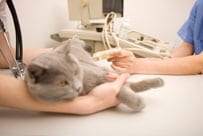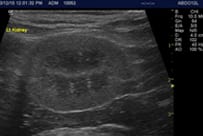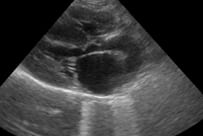Abdominal Ultrasound & Echocardiography
What is ultrasound?

We offer two type of ultrasounds at Cat Care Clinic: Abdominal ultrasound is used to evaluate organs in the belly, while cardiac ultrasound (called echocardiogram) is used to diagnose heart problems. Here we discuss abdominal ultrasound.
What is the difference between x-rays and ultrasound?
X-rays (radiographs) give a 2-dimensional view of internal organs and bones. They show the outline of body tissues, but do not do a good job of showing the inside of organs. Ultrasound gives a three-dimensional view of the organs and can “see inside” of them as well. Ultrasound and radiography are commonly used as complementary imaging tests; this means they are both used to give a more complete picture of the disease.
How does my cat get an ultrasound?
For an ultrasound, the fur on your cat’s belly is shaved. This allows us to “see” better with the ultrasound probe. Your cat is placed on his/her back in a soft padded V-shaped bed. The vast majority of cats will tolerate this with an assistant holding them still and comforting them if they become anxious. Ultrasound gel is placed on your cat’s tummy to get a better image. The gel is water-soluble, so it is safe if your cat licks and ingests it.
Does my cat need to be sedated for ultrasound?
Most cats do not need sedation. If your cat does need sedation, we take into consideration his/her illness to choose the most appropriate sedatives.
Why would my cat need an ultrasound?
Ultrasound can be used as an aid to diagnose the following conditions:
- Kidney disease (e.g. chronic renal disease, polycystic kidney disease)
- Liver disease (e.g. hepatitis, hepatic lipidosis, liver flukes)
- Pancreatitis
- Gastrointestinal disease (e.g. inflammatory bowel disease)
- Bladder problems (e.g. chronic cystitis)
- Pregnancy
- Cancer
Sometimes ultrasound does not always give an exact diagnosis but it can direct us towards the next step. For example, if an abnormality is found in the intestines, the ultrasound can determine whether we can biopsy it through the skin or if we need to take your cat to surgery.
Who does the ultrasound exams?

How much does an ultrasound cost?
Ultrasound is a highly technical diagnostic tool and requires extensive training to use accurately. Consequently the cost reflects the use of this advanced tool. We give each owner an estimate prior to performing an ultrasound.



